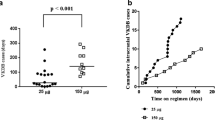Abstract
A 1 mg dose of vitamin K given intramuscularly at birth prevents almost all cases of late VKDB, whereas even two oral doses of 1 mg vitamin K given in the first week and a third given in week 5 to 6 are less effective. Is efficacy improved by increasing the dose to 3 × 2 mg? For active surveillance of VKDB, monthly postcards which include a nothing-to-report option, were sent to all heads of pediatric hospitals in Germany from January 1995 to December 1998. All reports were validated according to a standard case definition for late VKDB by means of a questionnaire. The incidence of VKDB with three oral doses of 2 mg vitamin K is compared to previously published rates for VKDB on 3 oral 1 mg oral doses, which had been ascertained with the same surveillance scheme. The number of cases of VKDB (excluding the failure-of-management cases) in children aged 8 days to 12 completed weeks during the 4 year period was 23. 14 had intracranial hemorrhage, 22 had been exclusively breastfed, and in 20 cholestasis was detected after the bleeding episode. 14/23 had been given all recommended 2 mg doses for vitamin K prophylaxis. Until 1996 all had been given the cremophor vitamin K preparation, whereas in 1997 to 1998 two children with late VKBD had received the new mixed micellar (MM) preparation, first licensed in July 1996. The incidence of VKBD per 100,000 live births during the 1995 to 1998 period was 0.72, including children given no vitamin K prophylaxis, and 0.44 for children who had received all age-related recommended vitamin K doses.
These incidence rates are significantly lower than those previously published for the 3 × 1 mg dose regimen in Germany (1.8 cases of late VKDB per 100,000 live births in children who had received all recommended vitamin K doses). Not all cases of late VKDB, however, are prevented by the 3 × 2 mg dose regimen, even if the new mixed micellar preparation is given instead of the cremophor preparation.
Similar content being viewed by others
Author information
Authors and Affiliations
Rights and permissions
About this article
Cite this article
von Kries, R., Hachmeister, A. & Göbel, U. Can 3 oral 2 mg doses of vitamin K effectively prevent late vitamin K deficiency bleeding?. Eur J Pediatr 158 (Suppl 3), S183–S186 (1999). https://doi.org/10.1007/PL00014352
Issue Date:
DOI: https://doi.org/10.1007/PL00014352




